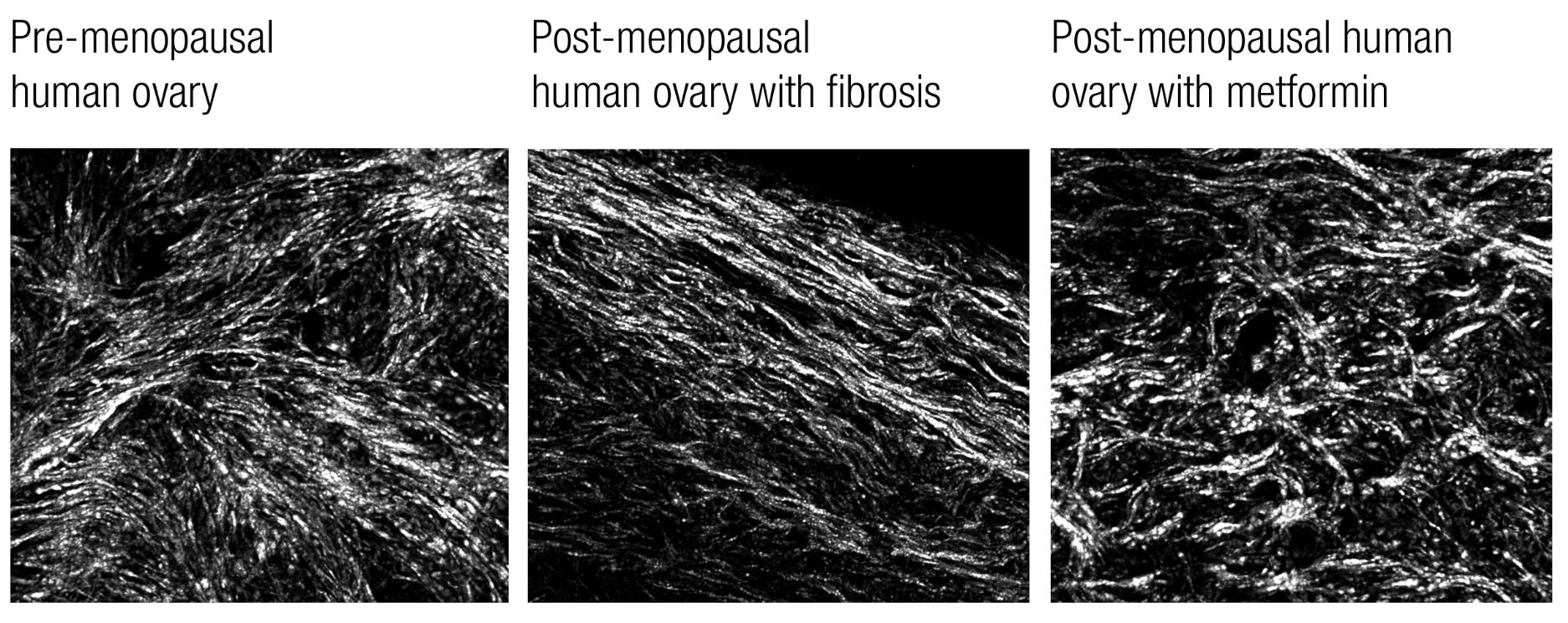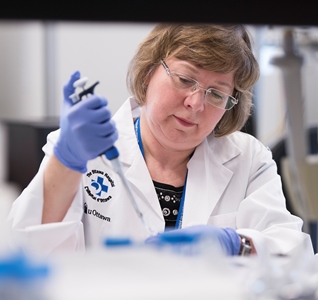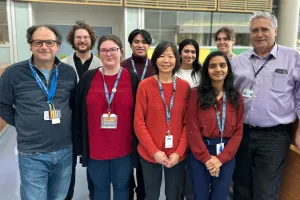“Wild idea” opens possible new frontier for preventing ovarian cancer
 Researchers found that fibrosis develops with age in the ovaries (the smooth parallel fibers in the middle panel). The research team found that the ovaries from post-menopausal women taking the diabetes drug metformin did not have fibrosis.A laboratory study published in Clinical Cancer Research offers a new hypothesis about how ovarian cancer forms and suggests how it might be prevented.
Researchers found that fibrosis develops with age in the ovaries (the smooth parallel fibers in the middle panel). The research team found that the ovaries from post-menopausal women taking the diabetes drug metformin did not have fibrosis.A laboratory study published in Clinical Cancer Research offers a new hypothesis about how ovarian cancer forms and suggests how it might be prevented.
The study is the first to show that the natural stiffening of the ovaries called fibrosis occurs with age. It also suggests that the diabetes drug metformin may be able to halt this process.
"Fibrosis happens when body tissues are repeatedly injured and inflamed, leaving behind hard collagen fibers that pile up over time, like a scar on the skin," said Dr. Curtis McCloskey, the lead author,  Dr. Curtis McCloskey"Cancer cells tend to like growing in these fibrotic tissues."
Dr. Curtis McCloskey"Cancer cells tend to like growing in these fibrotic tissues."
Dr. McCloskey performed the research while he was a PhD student in Dr. Barbara Vanderhyden's lab at The Ottawa Hospital and the University of Ottawa. He is now a postdoctoral fellow at the Princess Margaret Cancer Centre.
Ovarian cancer is the fifth most common cancer in women, and among the deadliest, with a five-year survival rate of 45 percent. Women who have a family history of ovarian cancer or a mutation of the BRCA gene are at greatest risk of the disease. There is no reliable screening test to catch this cancer early. The only options for prevention are birth control pills, which reduce the risk of ovarian cancer by half, or removing the ovaries and fallopian tubes.
The team found that fibrosis of the ovaries is a normal part of aging, usually appearing after menopause. During his research, Dr. McCloskey was surprised to find an ovary from a 69-year-old woman that had no fibrosis. Medical records showed she had been taking metformin, a drug for Type 2 diabetes. A Taiwanese study had previously noted an 82 per cent reduction of ovarian cancer rates among Type 2 diabetes patients taking metformin. Dr. Barbara Vanderhyden'
Dr. Barbara Vanderhyden'
The research team performed a series of experiments to investigate the links between ovarian fibrosis, aging and metformin.
First, they wanted to know what was causing the fibrosis. They thought the answer might lie in ovulation. Every time an ovary releases an egg it becomes inflamed, creating a monthly cycle of wound and repair.
To test this theory, the team used a drug that prevents mice from ovulating. The treated mice did not develop ovarian fibrosis with age, which suggested that ovulation might be linked to the development of fibrosis. However, more detailed studies are needed to confirm this finding.
Second, the team examined 27 ovaries that had been removed from women aged 21 to 82. Most of the ovaries from post-menopausal women were fibrotic. Although only five ovaries came from post-menopausal women who were taking metformin, none of these five had evidence of fibrosis.
Taken together, these findings suggest that targeting ovarian fibrosis might be a new option to reduce the risk of ovarian cancer and add rationale for the use of metformin to prevent ovarian cancer.
"This study was about putting two and two together," said Dr. Vanderhyden, a senior scientist at The Ottawa Hospital and professor and Corinne Boyer Chair in Ovarian Cancer Research at the University of Ottawa. "Now we're doing more research to learn how fibrosis develops in the ovaries, and how metformin stops it from happening."
The findings will need to be confirmed in more mouse models and human ovaries before clinical trials can start. A non-invasive test that can measure fibrosis in the ovary would also need to be created.
"We hope that someday metformin may prove to be an effective preventative treatment for younger women who are at high risk of ovarian cancer, but who can't remove their ovaries because they still want to have children," said Dr. Vanderhyden.
Reference: "Metformin abrogates age-associated ovarian fibrosis." Curtis W. McCloskey, David P. Cook, Brendan S. Kelly, Feryel Azzi, Christian H. Allen, Amanda Forsyth6, Jeremy Upham, Katey J. Rayner, Douglas A. Gray, Robert W. Boyd, Sangeeta Murugkar, Bryan Lo, Dominique Trudel, Mary K. Senterman, Barbara C. Vanderhyden. Clinical Cancer Research. Oct 9,2019
Core Resources: Stem Core
Funders: Research at The Ottawa Hospital is possible because of generous donations to The Ottawa Hospital Foundation. In particular, this study was possible because of donations from the late educator Margaret Craig, who wished to fund innovative, high-risk research in ovarian cancer. The study was also supported by the Canadian Institutes of Health Research.
About The Ottawa Hospital: Inspired by research. Driven by compassion.
The Ottawa Hospital is one of Canada's largest learning and research hospitals with over 1,100 beds, approximately 12,000 staff and an annual budget of over $1.2 billion. Our focus on research and learning helps us develop new and innovative ways to treat patients and improve care. As a multi-campus hospital, affiliated with the University of Ottawa, we deliver specialized care to the Eastern Ontario region, but our techniques and research discoveries are adopted around the world. We engage the community at all levels to support our vision for better patient care. See www.ohri.ca for more information about research at The Ottawa Hospital.
University of Ottawa: --A crossroads of cultures and ideas
The University of Ottawa is home to over 50,000 students, faculty and staff, who live, work and study in both French and English. Our campus is a crossroads of cultures and ideas, where bold minds come together to inspire game-changing ideas. We are one of Canada's top 10 research universities--our professors and researchers explore new approaches to today's challenges. One of a handful of Canadian universities ranked among the top 200 in the world, we attract exceptional thinkers and welcome diverse perspectives from across the globe. www.uottawa.ca
Media Contact: Amelia Buchanan, Senior Communication Specialist, Ottawa Hospital Research Institute; ambuchanan@ohri.ca; Office phone: 613-798-5555 ext 73687 Cell: 613-297-8315
Learn more about:
The Ottawa Hospital is a leading academic health, research and learning hospital proudly affiliated with the University of Ottawa and supported by The Ottawa Hospital Foundation.


